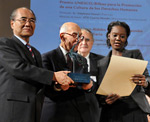| |
 |
 |
|
 |
 |
|
 |
 |
|
 |
| The Director-General awards the UNESCO/Bilbao Prize for the Promotion of a Culture of Human Rights |
 |
| On 10 December 2008, the Director-General of UNESCO, Mr Koïchiro Matsuura, celebrated Human Rights Day at UNESCO Headquarters by awarding together with the French Secretary of State for Foreign Affairs and Human Rights, Ms Rama Yade, and the Mayor of Bilbao, Mr Iñaki Azkuna, the UNESCO/Bilbao Prize for the Promotion of a Culture of Human Rights. |
 |
News 1 of 5

 This Day coincides with the anniversary of the adoption sixty years ago of the Universal Declaration of Human Rights (10 December 1948). This Day coincides with the anniversary of the adoption sixty years ago of the Universal Declaration of Human Rights (10 December 1948).
The prize, awarded in the presence of Mr Olabiyi Babalola Joseph Yaï, President of UNESCO’s Executive Board and the Brazilian writer Paulo Coelho, was given to the French diplomat Stéphane Hessel, who took part in the drafting of the Universal Declaration. The Honorable Mention was attributed to the International Movement ATD Fourth World, engaged in the fight against poverty.
While opening the ceremony, Mr Matsuura recalled that for UNESCO, an Organization created in the aftermath of the Second World War to ensure respect for universal justice, the rule of law, human rights and fundamental freedoms for all, this day was exceptional for many reasons.
“For our Organization, this day is also a moment to solemnly reaffirm the universal and indivisible character of human rights. It is the message which underpins UNESCO’s Constitution and embodies the force of the Universal Declaration of 1948. It has laid the foundation of a new world order, and sixty years later, this message remains intact,” underscored the Director-General.
Mr Matsuura also noted that the two ideals of the Preamble of the 1948 Declaration, namely to develop the respect for human rights and fundamental freedoms by teaching and education, and to protect human dignity inherent to all members of the human family, continued to guide UNESCO’s action. The Director-General particularly highlighted that these aims represent a framework for UNESCO’s activities focused on the four principal rights relevant to its competence: the right to education, the right to take part in cultural life, the right to freedom of opinion and expression and the right to enjoy the benefits of scientific progress and its applications. “These are crucial issues that lie at the heart of our commitment to make human rights universal. It is a daily struggle since every day brings more conviction that there could be no peace, no sustainable development, nor democracy, if fundamental rights of individuals are not respected. This is also a daily struggle because the international community still faces serious challenges to which solutions have to be found. I’m referring to economic and social rights, but also to a question as essential as the right to education,” he declared.
The Director-General paid tribute to Stéphane Hessel and to ATD Fourth World, represented by its Director, Mr Eugen Brand. “Today they embody different faces of our common message in favour of justice and dignity for all,” said Mr Matsuura, before recalling that commitment to the cause of human rights “can only subsist if it is borne day after day by such exceptional individuals and movements.”
Photo: © UNESCO/M. Ravassard
Related Links
|
|
|
| Author(s) |
Office of the Spokesperson - Flash Info N° 176-2008 |
| Publication Date |
11-12-2008 |
| Source |
Office of the Spokesperson |
|
|
|
|
|
|
|
 |
 |
 Email this page Email this page  Printable version Printable version
|
 |
|
|


